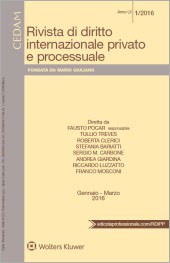Rivista di diritto internazionale privato e processuale (RDIPP) No 2/2020: Abstracts
 The second issue of 2020 of the Rivista di diritto internazionale privato e processuale (RDIPP, published by CEDAM) was just released. It features:
The second issue of 2020 of the Rivista di diritto internazionale privato e processuale (RDIPP, published by CEDAM) was just released. It features:
Fernando Gascón Inchausti, Professor at Universidad Complutense de Madrid, Does EU Law Ensure an Adequate Protection of Debtors in Cross-Border Enforcement? (in English)
- From a general perspective, cross-border enforcement of judicial decisions – and of authentic instruments – entails the need to coordinate different procedural systems, interacting with each other. From a practical point of view, however, cross-border enforcement is also a context of dialectic between opposing parties, typical of any judicial process. Its regulation, therefore, must be developed and interpreted taking into account the rights and powers attributed to the creditor and to the debtor, so that the promotion of efficiency – favourable to the creditor – is not detrimental to the debtor’s right of defense. This article assesses the extent to which the civil procedural law of the European Union adequately protects the debtor in cross-border enforcement and, where appropriate, what could be the most reasonable measures to improve it without unduly harming the right of the creditor to a prompt satisfaction of his right. Special attention shall be given in this framework to the legal position of consumers, due to their vulnerability and their special legal status according to EU protective law.
Maria Caterina Baruffi, Professor at the University of Verona, Gli effetti della maternità surrogata al vaglio della Corte di Cassazione italiana e di altre corti (‘Effects of Surrogacy in the Jurisprudence of the Italian Corte di Cassazione? and Other Courts’, in Italian)
- This paper examines the decision by means of which the Italian Supreme Court, in plenary session, on 8 May 2019 dealt with the issue of surrogacy, with particular regard to the notion of international public policy. The Court concluded that the ban on surrogacy constitutes a principle of public order aimed at protecting fundamental values, such as the surrogate mother’s human dignity. This decision is consistent with the advisory opinion given in April 2019 by the European Court of Human Rights, that, upon request of the French Supreme Court in the context of the Mennesson case, ruled that each State can discretionarily determine the modalities by which it guarantees the recognition of the parent-child relationship, including the possibility to adopt. Nonetheless, the difficulties in the application of public policy are apparent and the situations that may arise as a result of such application are equally complex, for instance as a result of genetic ties being established with different persons. Therefore, this paper puts forth new proposals, also in the light of the most recent French case law.
The following comment is also featured:
Roberto Ruoppo, Doctor in Law, Lo status giuridico di Taiwan e i suoi riflessi sul piano internazionalprivatistico (‘Taiwan’s Legal Status and Its Consequences from a Private International Law Perspective’, in Italian)
- This paper focuses on the consequences brought in the field of private international law by the lack of recognition of a State. In particular, the paper aims to understand if it is possible that actors of the international community give effect to the acts and decisions adopted by the authorities of an entity not recognized as a State. Notably, this work addresses the case of Taiwan which, despite the lack of recognition from the others States, owns all the factual requirements to be considered as an autonomous subject in accordance with international law. Relying to the principle of effectiveness and the analysis of precedent case-law – such as those involving the Soviet Union and the German Democratic Republic – this paper aims to demonstrate that the response to this question should be premised on the consideration of the interests involved in the specific case. The conclusion reached is that the acts of an entity which lacks recognition should be given effects in the other States when this is more consistent with the principle of legal certainty and the legitimate expectations of the individuals involved.
In addition to the foregoing, this issue features the following book review by Roberta Clerici, Professor at the University of Milan: J. von Hein, E.-M. Kieninger, G. Rühl (eds.), How European is European Private International Law? Sources, Court Practice, Academic Discourse, Intersentia, Cambridge, 2019, pp. XXVI-373.